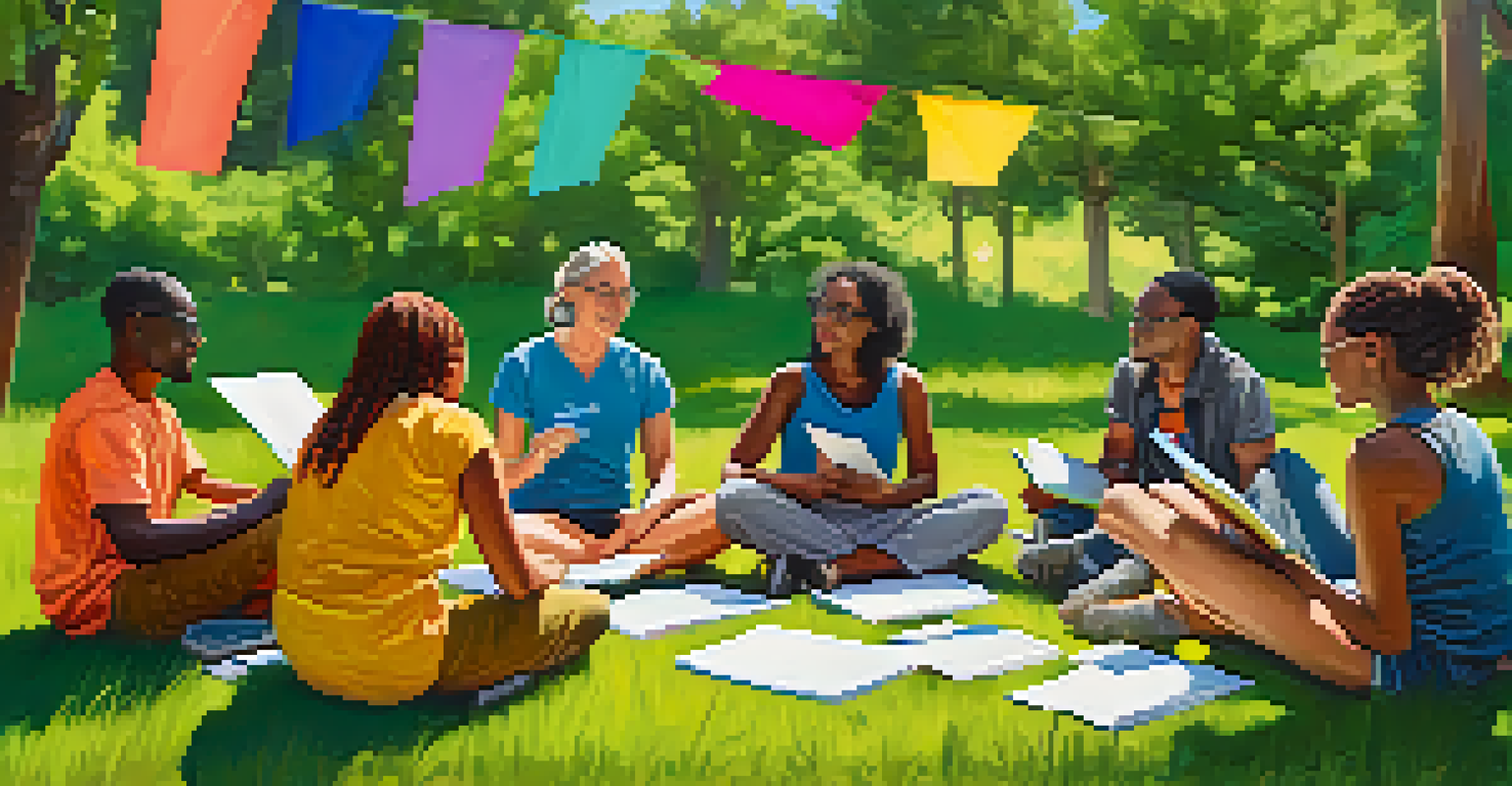Building a Growth Mindset for Lifelong Skill Learning

Understanding Growth Mindset vs. Fixed Mindset
A growth mindset is the belief that abilities and intelligence can be developed with effort and persistence. In contrast, a fixed mindset suggests that our talents are static and unchangeable. This fundamental difference shapes how we approach challenges and setbacks in learning new skills.
The mind is everything. What you think you become.
For instance, someone with a growth mindset might view a failed project as a valuable learning opportunity, while a person with a fixed mindset may see it as a reflection of their abilities. This perspective can significantly influence motivation and resilience in the face of difficulties. Embracing a growth mindset opens the door to endless possibilities in skill acquisition.
By recognizing the distinction between these two mindsets, we can begin to shift our thinking and adopt a more positive approach to learning. This shift is essential for lifelong skill development, as it encourages us to embrace challenges and persist through obstacles.
The Importance of Embracing Challenges
Challenges are often seen as roadblocks, but they can also be stepping stones for growth. When we encounter difficulties, especially in learning new skills, it’s crucial to embrace them rather than shy away. Each challenge presents an opportunity to expand our capabilities and deepen our understanding.

For example, consider learning a new language. Initially, it might feel overwhelming, but tackling the intricate grammar rules and vocabulary gradually builds your proficiency. Embracing these challenges not only enhances your skills but also boosts your confidence, reinforcing the belief that you can achieve more.
Growth Mindset Fuels Learning
Adopting a growth mindset encourages individuals to see challenges as opportunities for skill development.
By shifting our mindset to view challenges as opportunities, we cultivate resilience. This resilience becomes a valuable trait that supports lifelong learning, enabling us to approach new experiences with curiosity and determination.
Cultivating a Love for Learning
Fostering a genuine passion for learning is key to developing a growth mindset. When we enjoy the process of learning, we are more likely to engage deeply and persist through difficulties. This love for learning can be sparked by exploring topics that excite us or by connecting new skills to our interests.
It's not that I'm so smart, it's just that I stay with problems longer.
For instance, if you love cooking, you might take up learning about nutrition or new culinary techniques. This connection not only makes the learning process enjoyable but also motivates you to continue exploring and expanding your skill set. The more we engage with our passions, the more we enhance our skills.
Creating an environment that encourages curiosity and exploration further nurtures this love for learning. Surrounding ourselves with inspiring materials, mentors, and communities can fuel our desire to learn, making the journey an exciting adventure.
The Role of Feedback in Skill Development
Feedback is a powerful tool in the skill-learning process. It provides us with insights into our performance and areas for improvement. Embracing feedback, rather than fearing it, is crucial for developing a growth mindset and enhancing our skills.
Imagine you're learning to play an instrument. Receiving constructive feedback from a teacher can highlight what you’re doing well and where there’s room for improvement. This guidance helps you refine your technique and grow as a musician, reinforcing the idea that progress is possible through effort.
Embrace Challenges for Growth
Facing difficulties head-on cultivates resilience and enhances learning experiences.
By actively seeking feedback and viewing it as a pathway to growth, we cultivate resilience and adaptability. This not only improves our skills but also fosters a positive relationship with learning, encouraging us to keep pushing our boundaries.
Setting Realistic Goals for Skill Acquisition
Setting achievable goals is essential for maintaining motivation and tracking progress in skill learning. When we establish clear, realistic objectives, we create a roadmap that guides our efforts and keeps us focused. This structured approach makes the learning process feel more manageable and rewarding.
For instance, if you're learning to code, setting a goal to complete a specific project rather than just saying 'I want to learn coding' can provide direction. Each small milestone you reach along the way reinforces your growth mindset and keeps the momentum going.
Moreover, celebrating these small wins helps maintain motivation over the long term. Recognizing your progress fosters a sense of achievement and encourages you to take on even bigger challenges as you continue your learning journey.
Building a Supportive Learning Environment
Creating a supportive learning environment is crucial for nurturing a growth mindset. Surrounding yourself with encouraging individuals who share a passion for learning can significantly impact your journey. This support system fosters collaboration and motivation, making the learning process more enjoyable.
Consider joining a study group or a community of learners who share similar interests. Engaging with others allows for the exchange of ideas, resources, and experiences, enriching your understanding and keeping you accountable. Together, you can celebrate successes and navigate challenges.
Supportive Environments Matter
Creating a positive learning environment promotes collaboration and motivation, essential for skill acquisition.
Moreover, a positive environment encourages risk-taking and experimentation. When you feel safe to make mistakes and learn from them, you’re more likely to embrace challenges and persist in your skill development.
Practicing Self-Compassion in Learning
Self-compassion plays a vital role in maintaining a growth mindset. It involves treating yourself with kindness and understanding during challenging learning experiences. Acknowledging that everyone struggles at times can help alleviate the pressure to be perfect, making the learning process more enjoyable.
For example, if you find yourself struggling with a new concept, practicing self-compassion means reminding yourself that it's okay to not have all the answers right away. Instead of criticizing yourself, recognize that learning is a journey filled with ups and downs. This perspective encourages resilience and fosters a healthier relationship with learning.

By cultivating self-compassion, you can navigate setbacks more gracefully. This nurturing approach allows you to bounce back from challenges and continue pursuing your goals with renewed determination.
Lifelong Learning: The Journey Ahead
Developing a growth mindset is not just a one-time effort; it's a lifelong journey. As we engage in continuous learning, we uncover new skills and interests that enrich our lives. Embracing this ongoing process opens doors to personal and professional growth that can lead to exciting opportunities.
Imagine approaching each new skill with the curiosity and resilience you’ve cultivated. Whether it’s learning a new language, picking up a musical instrument, or exploring a hobby, the growth mindset equips you to tackle challenges with confidence and enthusiasm. The possibilities are endless when we commit to lifelong learning.
In conclusion, building a growth mindset for lifelong skill learning involves understanding the differences between mindsets, embracing challenges, and fostering a supportive environment. By practicing self-compassion and setting realistic goals, we create a fulfilling journey that enriches our lives and keeps us engaged in the pursuit of knowledge.